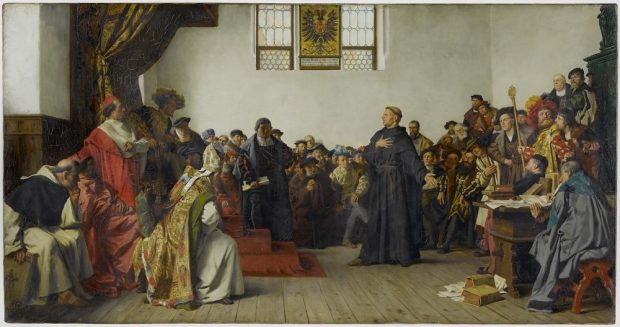One can go through life facing various struggles. Our lives today are fairly cushy compared, for example, with that of the migrants who settled in a new country such as Australia, Canada or South Africa in the 1950s. We can have deep respect and appreciation for those “liberated” reformed pioneers who left their homeland to settle in a foreign land in the early 1950s. They struggled and toiled, instituted churches and established schools; and the Lord has wonderfully blessed their labours.[i] But most had experienced even tougher struggles.
Even before they migrated, they faced the tremendous difficulties associated with the Nazi occupation of the Netherlands – the food shortages, the cold winters without heating and the constant danger of being rounded up for work in Germany, or imprisoned for speaking against Nazism, or execution for hiding Jews or being involved in underground resistance.
However, for many the toughest, most challenging and some ways costliest time was the church Liberation of 1944. It was the struggle to be faithful to the LORD in the call to leave what had become a false church in doctrine and actions. And it caused much friction. The late Prof. B Holwerda said the Liberation would have cost him ten years of his life. (He died aged 42.) The Liberation, like the Secession of 1944 and the great Reformation of the 16th century, was a struggle that split families and friendships, cost some men their jobs and others their homes. Rev D. van Dijk’s book My Path to Liberation[ii] shows something of the heart ache and psychological pressures which accompanied an obedient decision in relation to that church Liberation, now 75 years ago.
It is, of course, one thing for us in our comfortable lounges to say that the people at the time of Luther and Calvin and other reformations had to break with unfaithful churches; but when faced with the need to do so, how would we react? Many who saw the errors and what needed to be done backed down during times of reformation, going the way of disobedience. Being obedient and trusting in the LORD at such critical times appeared for many to be an insurmountable hurdle.
And that’s what happened in the Liberation of 1944. Rev. van Dijk says that there were numerous people who expressed concerns about the development in the  Reformed churches leading up to that Church Liberation. However, when it came to the crunch, many of these people just could not bring themselves to make the necessary step. They “stayed behind under the yoke when the Liberation finally came and called them to obedience”. This applied to both consistories and congregational members:
Reformed churches leading up to that Church Liberation. However, when it came to the crunch, many of these people just could not bring themselves to make the necessary step. They “stayed behind under the yoke when the Liberation finally came and called them to obedience”. This applied to both consistories and congregational members:
“They had acted so concerned about the developments! But when it was time to throw off the yoke in a royal way and walk forward in the freedom that is ours in Christ, they stalled. The path to liberation was not for them.”
This was nothing new, says Rev van Dijk, “the very same thing happened in the days of the Secession [1834] and the Doleantie [1886]” and we may assume that it was no different in the time of the Great Reformation of the 16th Century.
What was it that held so many people back from following the proper path? Rev. van Dijk gives several reasons. First there “were people with hesitant natures who did not dare to take the decisive step out of the fear that they were making a mistake”. Then there were those who “dreaded all the pressure and unrest that would come into their lives” threatening the “smooth and beautiful life they had been living”. Still others were afraid that going with the Liberation would affect “their income or their position in society”. Finally, “quite a number of men stayed behind” in the synodical churches “because their wives were not willing to support them”.
He expresses great appreciation for ministers who, in the face of great difficulties, acted in obedience by taking the decisive step. They knew that they could count on only a few consistory and congregational members joining them. They knew they would lose their manse and their church building. They knew that they would lose their income, their stipend. And yet they were obedient; they were given the courage that flows from faith. Rev van Dijk says:
“When I come into contact with such ministers in their small congregations, serving in lonely posts where they nevertheless remain faithful, I feel small and ashamed. Brothers, I salute you! May God reward you richly for all that you have done for His Church.”
Rev van Dijk is also full of praise for women who in such difficulties stood beside their husbands. He says:
“What a wonderful privilege the Lord has given us, to have a wife who stood next to us in the struggle and never held us back and never made obedience difficult for us. Sisters, your names are not mentioned in our newspaper, and there were but few witnesses to your struggles and faithfulness. But I want to assure you that we ministers said to each other many times: ‘What a grace it is in such a time to have a wife who comes along and works with us out of complete conviction.’ I have deep respect for those wives who understood, perhaps even better than their husbands, what sorrows would be bound up with the Liberation as far as family life is concerned. Even then, they did not hesitate. Sisters, do not forget that our Father who sees in secret will reward you openly.”
Those men and women knew the issues; they read about what happened in church life and knew that for each person the central question was obedience to the Lord. Hard as it may seem at times, that simple obedience trumps every other consideration—family, employment, friendships, even life. Later they and their descendants reaped the dividends of the faithful obedience. It is for us, their descendants, to continue in that obedience. May God graciously work that in us through the generations.

We sing with gusto Luther’s hymn A Mighty Fortress with the words
“Let goods and kindred go,
This mortal life also;
the body they may kill,
God’s truth abideth still”.
It takes faith and faithfulness to act in accordance with such words. Luther did. Inspired by the Holy Spirit he stood strong in the storm. Remember how he was summoned to appear for trial on a charge of heresy at the Diet of Worms, and how his friends thought he’d be killed and tried to dissuade him from attending? Certain that God required him to attend, he said he’d go “even if there were as many devils there as there were tiles on the rooftops”. And he did.
May God grant us to see matters rightly and, should the need arise, act with the conviction of obedience to His Word. Such obedience is always the test of faith. In a recent sermon the minister said: “that [obedience] is always Scripture’s measure of the good life: Have we lived by true faith in God and done his will?”[iii]
Every reformation is a gift of God’s grace but often brings immense challenges. How great a blessing it is when, at such crucial moments, He works faith and faithfulness in the hearts of His children! May the faithful obedience that characterised our forefathers at the time of the Liberation and who—having migrated to this vast country—sought to instil it in their children, continue to characterise us who share in the abundant blessings the Lord has bestowed on the fruit of their labours. Blessed are they who go forward in obedience, placing their trust in Him alone. Yes, “blessed is the man who trusts in the LORD, and whose hope is the LORD” (Jer. 17:7).
[i] Br Johan Bosveld’s book Free Reformed Pioneers gives a taste of some of the challenges those early migrants faced in a new land and how they sought to be obedient to the LORD.
[ii] See esp. pp. 361-364
[iii] Sermon on 2 Kings 2:1-18, https://theseed.info/sermon.php?id=1888